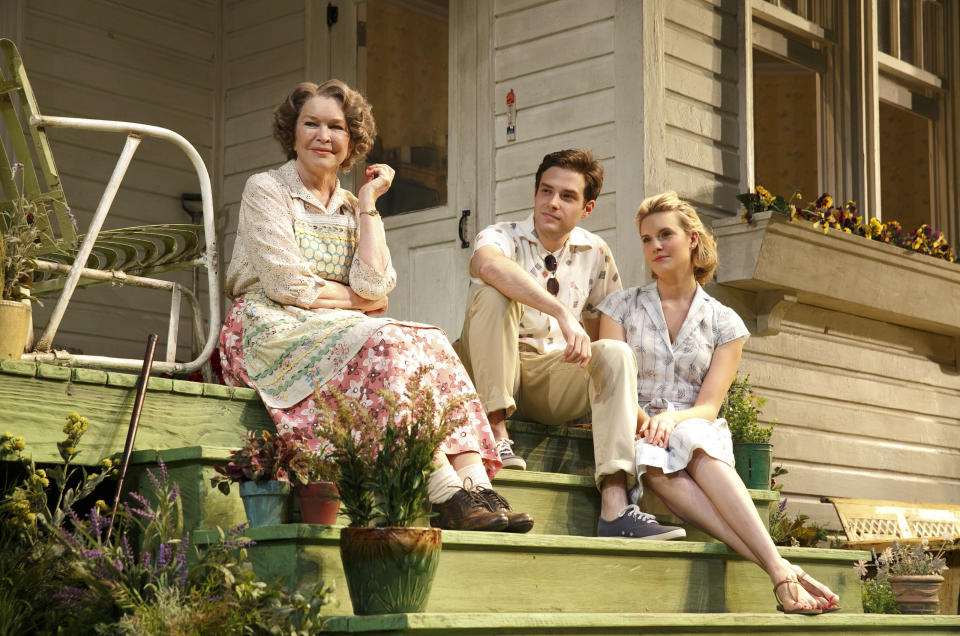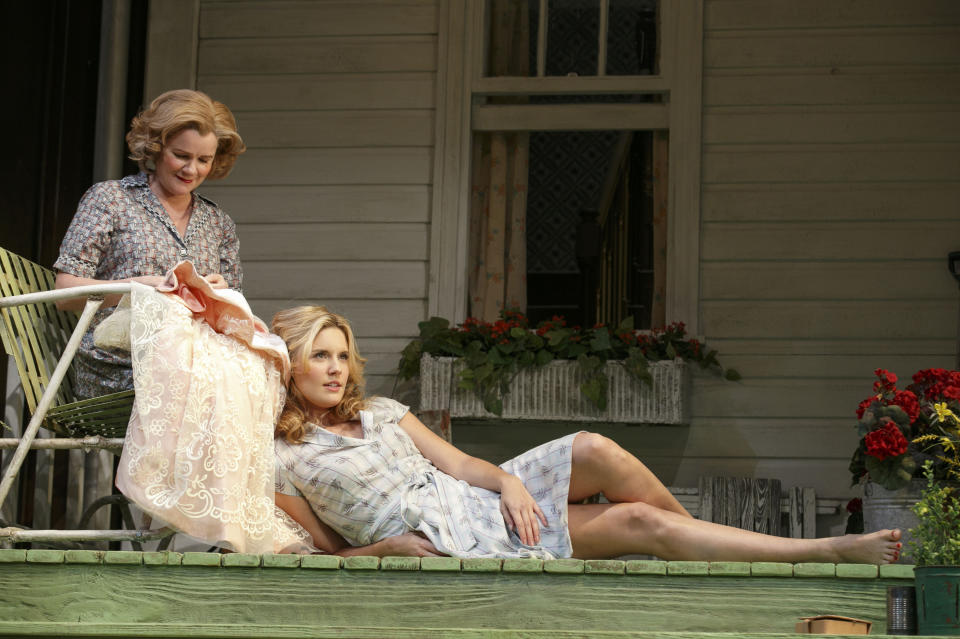Review: This 'Picnic' basket has a sexy drifter
NEW YORK (AP) — When hoping for a dramatic change in your life, be careful what you wish for.
William Inge's 1953 Broadway hit, "Picnic," a subsequent Pulitzer Prize-winner for drama, is about how the Labor Day weekend arrival of a charismatic young drifter shakes up the lives of everyone he encounters in a small Kansas town. Some for the better, some for the worse.
The promise represented by attractive young people's fleeting opportunities, contrasted with several older women's generally unrealized dreams, is a major focus of the current Roundabout Theatre Company revival, which opened Sunday night in a polished, classy production at the American Airlines Theatre.
Inge might be amazed that his bittersweet examination of life's disappointments is here presented as a broader comedy, but director Sam Gold and the seasoned cast members mostly make it work. "Picnic" was one of Inge's four consecutive Broadway hits during the 1950s, which included "Come Back, Little Sheba," ''Bus Stop" and "The Dark at the Top of the Stairs." Each was made into a popular Hollywood film as well, and all were about the circumscribed, yearning lives of small-town Midwesterners whose youthful hopes and later disappointments were universally recognizable.
Gold has overlaid humorous interpretations onto Inge's stilted and dated dialogue, often to good effect, while still keeping the period feel. If this technique doesn't help amp up the tension that should be building throughout the play, it makes for good entertainment on the handsomely detailed set of scuffed-up houses with a claustrophobic rusty-looking wall towering above.
That tension should be caused by the problematic romantic possibility between sheltered, beautiful and bored 18-year-old Madge Owens (Maggie Grace, a little stiff in her Broadway debut), and Hal Carter, (Sebastian Stan, relaxed, sexy and swaggering), the appealing but unsuitable drifter with a checkered past.
While there's not always onstage steaminess between this good-looking pair, they share a lovely, graceful dance together. Stan comes more to life when Hal finally provides some backstory, although initially he's just a sweaty, half-naked, eye-catching prop, strolling back and forth for the ladies to swoon over. Which many of them do, broadly and repeatedly.
Although the women fan themselves a lot, both to indicate late-summer hot weather and to convey Hal's effect on them, some of the most genuine onstage heat — aside from Hal's torso — comes from Elizabeth Marvel, portraying winking, wisecracking, single schoolteacher Rosemary with polished zeal.
When not openly gaping at Hal, Rosemary professes to love her carefree single life. Until, after some reckless drinking and wild dancing, Marvel nearly sears the stage with Rosemary's unexpectedly spiteful outburst against Hal. Marvel then turns Rosemary into a heart-wrenching, yet determined mess, as she pleads with her obviously reluctant beau Howard to marry her. Off-Broadway star Reed Birney, seeming at ease in his Broadway debut, skillfully portrays the conflicted, long-confirmed bachelor.
Ellen Burstyn is quite poignant as the Owens' older neighbor, Mrs. Potts, wistfully charming in her innocent enjoyment at the presence of a handsome young man. Burstyn, winner of an Academy Award, an Emmy and a Tony, is a constantly reassuring presence in a smaller but essential role.
Another seasoned actor put to good use is Mare Winningham as Madge's protective widowed mother, Flo. Winningham effectively broods and flounces and shoots fierce glares, as Flo anxiously tries to keep her wavering daughter on track to maximize her looks and reel in a wealthy young suitor.
Madeleine Martin is great fun as 14-year-old Millie Owens, spewing out the open honesty of a smart teenager in her strangely raspy yet high-pitched voice. As Madge's plainer sister, Martin easily handles the difficult mixture of a younger sibling's admiration and envy. Madge's adoring, well-to-do but conventional boyfriend, Alan, is played with earnest niceness by Ben Rappaport.
Not much happens until something finally happens, and then everything happens very quickly and the play ends in a rush, with Gold's nuanced ending putting a hopeful spin on Inge's original, generally downbeat outlook. Speaking about important life lessons Flo hopes to tell Madge, Mrs. Potts wisely points out, "Let her learn them for herself." Which is a chance everyone needs to take, however things may turn out.
___
Online:
http://www.roundabouttheatre.org


